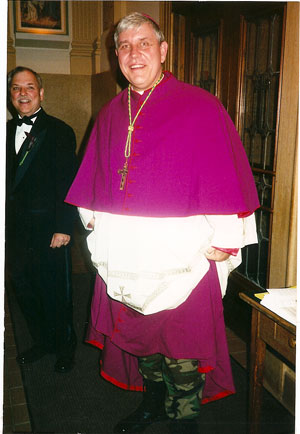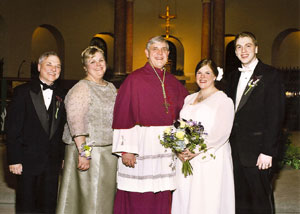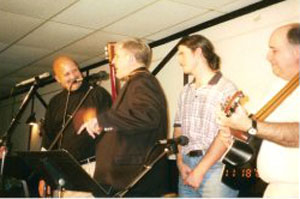
Standing behind his good friend in the receiving line at a wedding this summer, George Rutkowski suggested his former classmate might be in line for a job opening.
“Jerry, you’ve been in La Crosse for a long time; isn’t it about time you moved on? There’s an opening in Milwaukee …,” Rutkowski remembers saying to the friend he’s known as Jerry since their days riding the 79th Street bus together in Chicago on their way to Quigley Preparatory Seminary South High School.
But then-Bishop of La Crosse Jerome E. Listecki quickly quashed that thought.
“Yeah, they do move people on, and the pope has to decide, but I really don’t think it would be me,” he replied to Rutkowski, a married father of two grown children and a Chicago-area director of marketing for a residential plumbing manufacturer.
While Bishop Listecki may not have been expecting the appointment as the 11th archbishop of Milwaukee, made by Pope Benedict XVI and announced on Saturday, Nov. 14, the honor was no surprise to any of the friends who, since high school, predicted Jerry would go far in whatever he chose.
The friends – Rutkowski, Greg Strobel, Jesus (Manny) Sosa and “Jerry” – bonded during their daily bus ride to school and also over regular pick-up basketball games at local parish gyms on their off day from seminary classes – Thursdays.
No one more enthusiastic
“There wasn’t a sport he didn’t try,” said Sosa of Jerry. “He decided he could do them all and was usually limited only by injury and time,” he said, adding that his friend was “good at all of them.”
Strobel added that while there were athletes in school who may have been more talented than his best friend, “nobody would hustle more or be more enthusiastic than Jerry.”
In fact, Strobel recalled that at Niles College of Loyola University where the two were on the baseball team, he said Jerry was a “Charlie Hustle type of guy.” The coach, however, had Jerry wear a batting helmet while playing outfield because “there were a few balls that went off his noggin a few times, but he still was one of the best players. Hitting was his strong point and got him into the lineup more than his fielding.”
Not only was Jerry an exceptional athlete, but he excelled in the classroom. He was the one seminarian that the others predicted would make it all the way through.
While the other friends eventually left the seminary and now are married fathers with children, Jerry persevered.
According to Sosa, even then his classmates felt, “there was no way he won’t make it,” he said of the friend they dubbed “Pope St. Jerry I.” Rutkowski noted that even in high school, classmates predicted Jerry would be the first bishop from their class.
“He had a quality, even in high school, that we knew he’d be a leader if he stayed on the path to ordination, and somewhere he’d lead a diocese. We just had that feeling,” said Rutkowski.
Part of Quigley folklore
Known for toeing the line and an unwillingness to bend or break rules, Jerry has become part of Quigley South’s folklore in terms of its demerit system. Sosa and Strobel were eager to share the story in phone conversations with your Catholic Herald.
“Quigley had a demerit system which in retrospect was a good system because we, in part, policed ourselves,” explained Sosa, noting that not only could professors give out demerits, but senior monitors were also able to pull a demerit card, if they observed an infraction.
Demerits were not hard to come by, explained Strobel, as the school had high standards for personal behavior. Infractions included tardiness or misbehavior in the hallways. “You did not have to do a lot wrong to get a demerit,” he added, noting that if a student received five demerits in one semester, it meant detention; and 25 led to expulsion.

“One of the things Jerry was really proud of was the fact he never got a demerit, for almost four whole years of school. Most of us had five, six or seven by this time, and as you can imagine, he liked to remind us of this fact,” said Sosa, now a retired educator who served 34 years in Chicago public schools.
Like most teachers and monitors at the school, Fr. William Henkel, an English teacher, knew Jerry was demerit-less and, according to Sosa, “he was really gunning for Jerry.”
One day, late in the school year, Jerry was standing in the hallway chatting with a group of seniors when he inadvertently leaned against the fire extinguisher, bumped it and broke the glass.”
“Well, Fr. Henkle hears this and runs out of the room, sees Jerry standing there, and right there, we all knew what was going to happen. With a twinkle in his eye, he goes into the gunfighter pose, pulls out his finger and points at Jerry and says, ‘Card,’” laughed Sosa. “Jerry was flabbergasted and he knew it wasn’t fair, but that was probably (Fr. Henkel’s) only shot,” said Sosa, noting that after the incident, the floodgates apparently opened and Jerry picked up a couple more demerits before graduation.
High personal standards
His high personal standards were also evident in his relationships, explained Strobel, a dentist who belongs to St. Francis of Assisi Parish in Orland Park. He recalled a time when Jerry met two young girls while on retreat and shortly after they came to watch him play basketball.
Some time later, one of the girls called Jerry inviting him to be her date for a Christmas dance.
“She had a crush on Jerry and Jerry somewhat had a crush on her, but he would never admit it, and she needed a date for herself and for one of her friends,” recalled Strobel, explaining that one of the girls became his future wife, Marilyn.
Jerry called Strobel to ask if he’d go along on the double date, but he arranged it so that Strobel was partnered with the girl he liked and he with the other. When Strobel asked him why he chose that arrangement, he explained he would feel better not breaking any rules.
“You see, we were not allowed to date, but were allowed to socialize,” he explained of seminary rules. “Jerry would never disobey the rules which is why I went with this girl. It really speaks of how Jerry sets very high standards for himself, with no semblance of impropriety.”
‘Original gentle spirit’
Calling Jerry “the original gentle spirit,” Rutkowski said he has a way of drawing people to himself. He described a mission trip to Oklahoma, along with Jerry and Sosa, between their junior and senior years of high school. While there, the high schoolers helped work in parishes, taught catechism classes and helped take a census.
“We had a lovely lady cooking for one of the priests; she was a Polish lady, who fell in love with Jerry,” he said, describing how people are attracted to his likeable personality. “You could tell she had a warm feeling in her heart for him and it showed in the way she cooked for him. She always made sure Jerry got the extra pancake, for example, and one day we had a contest – Manny, Jerry and I. Who could eat the most pancakes and, of course, Jerry won!” Said Rutkowski.
Always an exceptional person
Strobel echoed similar thoughts about his personality.
“He always was an exceptional person. When it would come to different family gatherings, years later, my aunts would always ask, ‘How’s Jerry?’” he said. “He really made an impression on people. You would remember his exuberance and I think that’s why he excelled at so many things.”
His friends agree that their high school buddy is still the same person they remember fondly hanging out with on the basketball court, or gathering Wednesday nights for a poker game. Strobel noted that occasionally an older classmate – Wilton Gregory, now Archbishop Wilton Gregory of Atlanta, would join them for the poker games.
While Jerry stood out for his academic, athletic and people skills, none of the others resented his successes.
“Sure he walks on water, but he was very well-liked, very common, very ordinary,” described Strobel. “He never seemed like a goody, goody to me. Believe me, we had a lot of fun without breaking all the rules.”

Never a rule-breaker
Because Jerry always played by the rules, Strobel said that one time when they were going smelt fishing late at night, Jerry felt compelled to contact his uncle, a desk sergeant at the police station, to tell him that he and some of his friends would be at the lake rather late.
Sure enough, when the boys were at the lakefront, an officer came by to check on them. Yet the smelting trip was doomed from the start, Strobel noted, explaining that Jerry’s athletic skills did them in.
“He could always throw things farther, hit things further and when we were at the beach smelt fishing, Jerry volunteered to throw the anchor into the water. He threw it so far and forgot to hang onto the other end of the anchor so we lost the anchor and that brought a quick end to the fishing,” he laughed.
After high school, Sosa and Jerry were two-thirds of a guitar band that played at folk Masses and even some weddings.
“When you got to college, if you didn’t play a guitar or have one on display in your room, you were ostracized,” joked Sosa, a member of Holy Family Parish, Shorewood, in the Diocese of Joliet. “Most guys couldn’t really play, but a few of us were a little more serious about it. We were all Peter, Paul and Mary fans and it was at the onset of folk liturgy in church, so we got involved in church music.”
He said the trio “thought we were really cool, and we used to charge $25 a guy (when we performed), which even back then was a steal.”
The band reunited in November 2000 for a benefit fundraiser at St. Ignatius Parish, Chicago, where now-Fr. Listecki had just been appointed pastor and fortunately commanded a greater fee.
Friends remain close
Over the years, the Quigley friends have remained close, getting together for family events such as their children’s baptisms and weddings. Several, including Jerry, gathered last summer at Strobel’s Michigan lake home for a few days, and this past summer, Bishop Listecki officiated at the wedding of Sosa’s son John.
He also officiated at Rutkowski’s daughter, Rebecca’s 2004 wedding, and has been back for confirmations and Rutkowski’s father’s funeral.
As Jerry has risen through church ranks, however, the friends realize the impact he’s making on others.
Shortly after he was ordained a bishop in 2001, Sosa said Bishop Listecki invited him and his wife, Margaret, to a Kingston Trio concert at Governor State University, about 40 minutes from Chicago.
“He got us tickets, took me and my wife, Margaret, and here we are out in the middle of the state, on a Sunday afternoon,” said Sosa, describing how he felt no one would know them in such an out-of-the-way place located on 760 acres of prairie. “We’re not there more than five minutes when it seems like every other person there knew him, either from one of the parishes or from the old neighborhood, so basically my wife and I were off on our own for a while, while he was there doing his thing.”
Happy that Jerry is moving closer to his Chicago roots, his friends hope they’ll see him more now that he will be less than two hours away.
And they predict that once Catholics in southeastern Wisconsin get to know him, they will come to love him, too.
“When he preaches – of course, I did not see a lot of that in high school – but he really is a terrific orator. He blends humor and content and everything and it comes out so well, which is not a surprise,” said Sosa. “I expected him to be good at this, but did not expect that good.”
